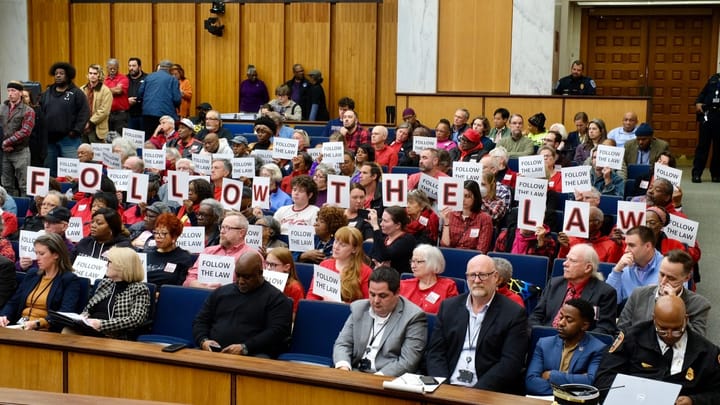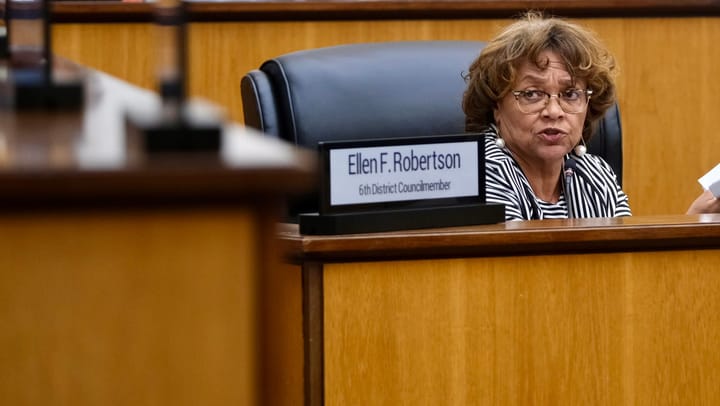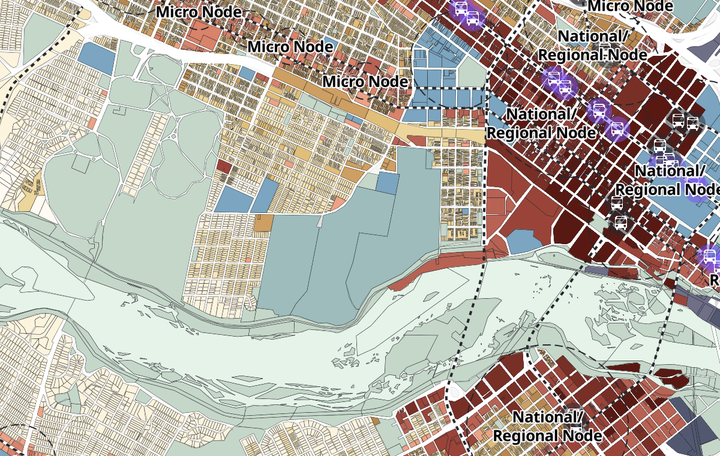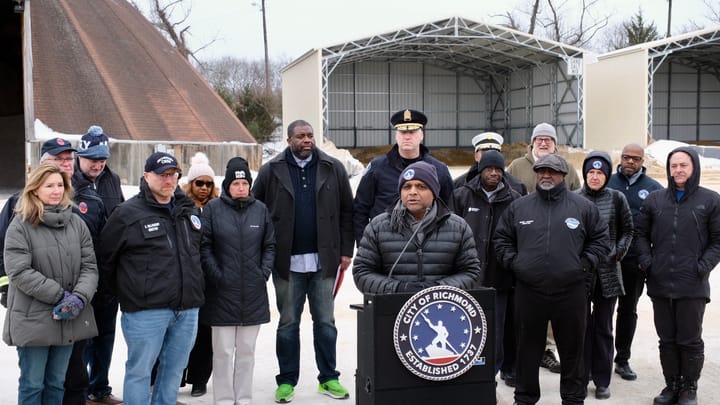RRHA board votes for more Gilpin talks but says it’s too early to OK redevelopment plans
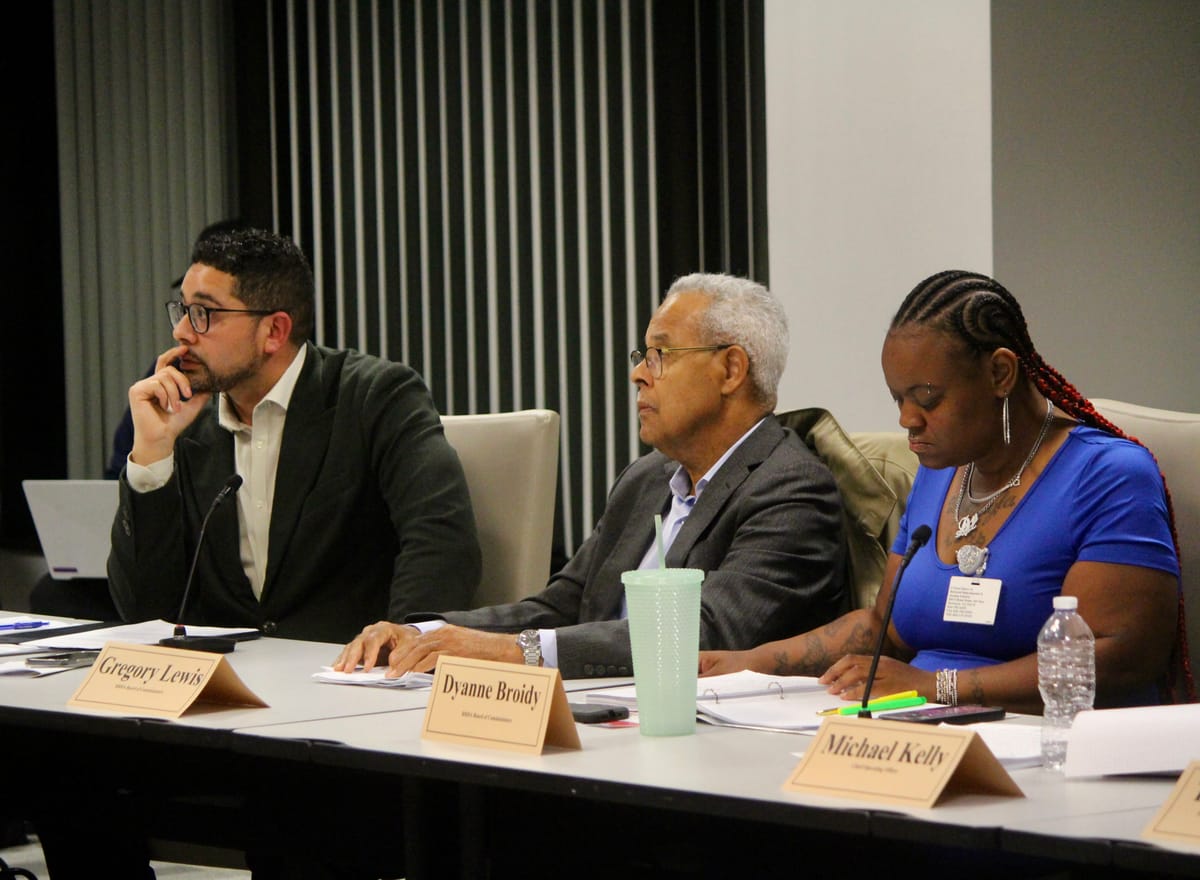
The board that oversees Richmond’s public housing authority on Wednesday said it supports CEO Steven Nesmith continuing talks with city officials about the redevelopment of Gilpin Court but rejected a request to authorize Nesmith to push forward with getting federal approvals for the project at this time.
“We do not have a meeting of the minds with the administration,” said Commissioner Kyle Elliott. “We do not have, and while maybe not legally required, a meeting of the minds with City Council. We’ve heard from a number of residents, and I’m not expecting that every single person will agree with the plan, but what we should be striving for is a unified direction by RRHA, City Council, administration, residents and all stakeholders.”
“At this point, we have not achieved that,” he concluded.
Wednesday night’s votes capped off a tumultuous week for the Richmond Redevelopment and Housing Authority, which has run into serious obstacles as Nesmith attempts to accelerate the redevelopment of Gilpin Court, Richmond’s oldest and largest public housing community.
Most controversially, Nesmith has pushed to have RRHA’s Board of Commissioners approve the transfer of Gilpin to the Richmond Development Corporation, the authority’s nonprofit subsidiary. A resolution to do so failed by one vote in April and set off a firestorm of opposition from some residents, community groups and members of City Council concerned about what the move might mean for public housing in the city.
The Richmonder is powered by your donations. For just $9.99 a month, you can join the 1,000+ donors who are keeping quality local journalism alive in Richmond.
In response, Nesmith tweaked his approach: While Gilpin would still be transferred to the RDC, those transfers would occur in phases as redevelopment proceeds, with a Board of Commissioners vote required for every transfer.
The amended proposal was expected to come before the board at its Sept. 17 meeting. But last Thursday, Mayor Danny Avula issued a public statement saying he could not support RRHA’s plans unless the authority met eight demands, including withdrawing the transfer proposal until “major concerns” about the RDC’s governance structure are addressed.
While city officials’ power over RRHA is limited — legally, the authority is a political subdivision of the state — the housing authority will have to get federal approval of its redevelopment plans through a process known as a Section 18 application. Among the requirements of that process are that RRHA secure a letter of support from the “chief executive officer” of the local government.
Nesmith called the mayor’s statement “disappointing” even as he said he was “optimistic” that talks would continue with members of City Council and Avula.
In the wake of Avula’s announcement, Nesmith put forward a new proposal to the Board of Commissioners that would authorize him to move forward with the Section 18 application and the phased transfer of the Gilpin properties. Additional language stated the move could only occur “after addressing the major governance concerns raised by the mayor” and specified that any redevelopment would have to follow the approach laid out in the 2023 Jackson Ward Community Plan, a document crafted with extensive community input.
Despite those efforts, the Board of Commissioners on Wednesday once again balked, voting down the resolution on a 6-3 vote.
“If we approve this now, based on promises that are in there, we have no say as to how those promises are returned to us,” said Commissioner Barrett Hardiman. “It really relinquishes our control.”
Instead, he urged the authority chief to bring back a resolution similar to an October 2021 measure that allowed the then-interim chief to begin the Section 18 process for Mosby Court.
Nesmith, however, argued it was “imperative” for the board to approve the resolution so RRHA could move forward with the Section 18 application and reserve tenant protection vouchers for all Gilpin residents.
Michael Syme, an attorney from Fox Rothschild who has been working with RRHA, acknowledged that trying to reserve the vouchers now was “an aggressive move.” But both he and Nesmith said the step was necessary given other federal cuts to housing funding by President Donald Trump’s administration, which they said raised the possibility that the authority might not be able to issue all the vouchers it needs to.
That view was persuasive for Commissioner Eddie Jackson, who said such an outcome “could be catastrophic.”
Others were less convinced of the need to move forward before other key parts of the application, like relocation plans and the tenant bill of rights, were hammered out.
“I don’t want to make a decision thinking it’s one thing and then it comes back something different,” said Commission Vice Chair Charlene Pitchford, who also serves as president of the Gilpin Tenant Council.
Hardiman, who repeatedly urged the board to vote down or delay the resolution, emphasized that the development process would continue even without the measure. Plans for the first phase of the project, which would construct 56 units on a vacant lot at the corner of North 1st St. and East Charity St., are currently under review by Richmond’s Planning Department.
“It doesn’t mean that the work stops,” said Hardiman. “It just means that we are waiting until we are assured that all of the things that need to be in this application are in this application.”
Support for more talks with city officials
After the failure of the Section 18 resolution, Nesmith pushed for the Board of Commissioners to pass a separate resolution declaring their support for him continuing to negotiate with the city to come to an agreement on the application.
Both Elliott and Hardiman objected repeatedly to the idea, saying Nesmith already has the power to talk with city officials to come to agreement about the project. The authority chief has already had multiple conversations with the mayor and members of City Council on Gilpin, which he previously characterized as “very constructive.”
Nesmith told the board Council President Cynthia Newbille had called him earlier in the day to set up another meeting involving Avula and City Councilor Kenya Gibson, whose district includes Gilpin.
Gibson had previously put forward a resolution ordering a halt to any further work with Gilpin’s developer until Council authorized it, but she withdrew it earlier this week, saying “there is shared agreement” that City Council will need to vote to establish the court as a redevelopment area.
“I’m now focused on the path forward to ensure transparency and community engagement as we progress,” she said.
Nesmith, though, insisted he needed the board to formally back his efforts to continue talks.
“There was a clear breakdown in negotiations, and that’s a fact,” he said.
Asked later to elaborate on what he meant, Nesmith pointed to Avula’s Sept. 11 statement, saying, "Originally we were supposed to come back to the negotiation table," but instead of being invited back to talk further, "I got something that was given to the public."
While the Commission stopped short of passing a formal resolution, members agreed on a 5-2 vote (Elliott abstained) to pass a motion voicing their support for further negotiations.
Afterward, Nesmith cast the decision as a significant victory.
“With the majority of the Board of Commissioners’ support, I feel empowered,” he said. “That’s what’s important. Everyone wants to feel empowered to go forward, and that’s what I got tonight.”
Rising tensions
With a price tag of almost half a billion dollars and an impact on roughly 2,000 residents, the Gilpin project is poised to be RRHA’s biggest overhaul of public housing yet. And comments Wednesday made it clear feelings are running high on both sides of the debate.
Sylvia Davis, a Gilpin resident who has been vocal in her criticism of the plan, has accused Nesmith of harassing her by calling her and her daughter on his personal cell phone and telling her to “stand down.” Hardiman has asked for an investigation of the allegations.
Nesmith acknowledged calling Davis but said he had spoken to her under the guidance of legal counsel.
“I did call her on my personal line because I told my staff this situation requires a personal touch,” he said. “I said, ‘Give me the number so I can make a personal outreach, so that this person knows how important this is to me.’”
Nesmith said RRHA has also turned over information to the police about threats made against a board member over her vote, who he said has also been “verbally assaulted.”
“That is unacceptable,” he said. “I ask that everyone bring the temperature down.”
Contact Reporter Sarah Vogelsong at svogelsong@richmonder.org
The Richmonder is powered by your donations. For just $9.99 a month, you can join the 1,000+ donors who are keeping quality local journalism alive in Richmond.


